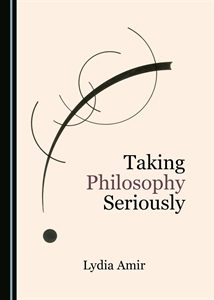 Lydia Amir is currently Visiting Professor in the Department of Philosophy at Tufts University, USA, Associate Professor at Beit Berl Academic College, Israel, and President of the Israeli Association for the Practice of Philosophy. Throughout her academic career, she has promoted philosophy both within and outside the academe, using her expertise in both to reflect on each other.
Lydia Amir is currently Visiting Professor in the Department of Philosophy at Tufts University, USA, Associate Professor at Beit Berl Academic College, Israel, and President of the Israeli Association for the Practice of Philosophy. Throughout her academic career, she has promoted philosophy both within and outside the academe, using her expertise in both to reflect on each other.
 The new book by Lydia Amir Taking Philosophy Seriously initiates a meta-philosophical dialogue that challenges the division between academic and practical philosophy.
The new book by Lydia Amir Taking Philosophy Seriously initiates a meta-philosophical dialogue that challenges the division between academic and practical philosophy.
There are two main ways of not taking philosophy seriously: one is exemplified by the philosophy professor who believes that philosophical theory is not relevant for life; the other, by the counselor who thinks that philosophical theory is not relevant for life.
The philosophy professor, who believes that his discipline is not relevant to life, is not taking his profession seriously. Were he to take seriously his profession as a teacher of philosophy, he would thereby participates in one form of practicing philosophy, for good teaching implies an appropriation of the matter at hand and a capacity of communicating the essential which are already a form of practicing philosophy. Moreover, even if that professor “merely” writes about or teaches, say, aesthetics or ontology, he can, without any special training, be a philosophical counselor for people interested in aesthetics or ontology. All that is required is his being a good professor, that is, one who does not avoid a direct contact with the student or the client (private student), who is enthusiastic about his profession, who goes to the essential, who knows how to listen, to question, to explain and to correct. If this is true, there is no discontinuity between academic philosophy and philosophical counseling.
The philosophical counselor who thinks that philosophical theory is not important is not so different from the professor discussed above. For this counselor does not trust his own discipline, philo-sophy, to display a love of wisdom or be a fruitful reflection on life. He might emulate forms of counseling taken from other disciplines, such as psychology, New Age theories, etc.… Not to take philosophy seriously is not to believe in her power as she is, not to use her with all her richness; but rather to sell her short, to misrepresent her, to pass her for what she is not.
To take philosophy seriously is to be loyal to her objectives: the forms of teaching may be different, among the consultancy, the groups outside the University and the classes at the University, but the objectives have to be the same, otherwise philosophy it is no more. As I see it, philosophy has three interrelated objectives. First, truth (at least by via negativa – eradicating our errors as in Karl’s Popper’s critical rationalism). Second, liberation, even partial, from illusions, preconceptions and self-centered intelligence; and third, wisdom, even if negative, in the humble sense of realizing that I do not know, and of finding out what I do not want to know, which results in better understanding or comprehension. The relation that holds among these objectives seems to be the following: liberation from untruth is the path to wisdom.